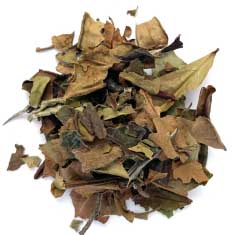What comes to mind when you think about a cup of tea? Tea is often portrayed as a beverage of comfort and
calm in our favorite books, TV shows and movies. It is often used as a beverage of hospitality, to aid
in meditation and help with focus. However, you shouldn’t limit tea to just a beverage of warmth and
contemplation. It’s a drink that many around the world consume on a daily basis for enjoyment and good health.
According to the Statista Research Department,
global consumption of tea hit 6.68 billion kilograms (approximately 7.36 million tons) in 2022 and is expected to
hit 7.4 billion kilograms by 2025. The country of Turkey
was given the distinction of being the largest tea-consuming country in the world per capita at 6.04 lbs.
In the United States, tea consumption may not be
as high on a per capita basis, but according to the Tea Association of the U.S.A.,
overall consumption was still quite high at around 85 billion servings in 2021. Perhaps the beverage is popular because
scientists have discovered that tea can do more than fight the chill of a cold winter’s night. In fact, tea may offer
a number of health benefits.
Let’s dive into a few reasons why you should add tea to your daily routine!

HIGH ANTIOXIDANT CONTENT
Tea, which is derived from the Camellia sinensis plant, contains an abundance of
bioflavonoids, which are powerful antioxidants. Of particular interest to researchers is a group of flavonoids called catechins, the most significant
of which is epigallocatechin gallate (EGCG).
What’s all the excitement over catechins? They have demonstrated an ability to
inhibit the production of peroxides and free radicals, which are responsible for damaging cellular material, including DNA and RNA. The catechin
content varies between teas because they are processed differently:
-

Black tea (also known as
pekoe or orange pekoe) contains more of the secondary flavonoids theaflavin
and thearubigin because the leaves are allowed
to ferment before drying, which promotes the oxidation of catechins.
-

Green Tea undergoes
a special steaming process without fermentation, which prevents oxidation from taking place.
-

White Tea is the least
processed, meaning that it contains the highest concentration of preserved catechins than all other teas.
Studies on these antioxidants and their interactions with the human body have
shown some promising results. While research is ongoing, we want to take a look at some of the potential benefits you can see when drinking tea!
THREE POTENTIAL HEALTH BENEFITS FROM REGULAR TEA CONSUMPTION
Researchers have been studying the health benefits of tea for the last 30 years. Here’s a brief summary of a few beneficial effects they’ve found:
#1. Anticancer Activity
In a series of
Mayo Clinic
studies, researchers found that EGCG in green tea was able to reduce the number of leukemia cells in patients with chronic lymphocytic leukemia (CLL).
The patients who participated in these studies were in the early stages of CLL, but it was encouraging to see positive results from the use of EGCG.
Other studies have shown that EGCG combined with chemotherapeutic drugs reduced
tumors better than green tea or drugs alone.
#2. Cholesterol control and blood pressure reduction
High cholesterol levels and blood pressure are both contributing factors to a number of heart diseases
and health problems. Epigallocatechin gallate, as well as other catechin polyphenols, may reduce
low-density lipoprotein (LDL) cholesterol, which is considered the “bad”
kind of cholesterol that contributes to the formation of arterial plaque. EGCG
has also demonstrated an ability to reduce blood pressure.
#3. Fat-burning Effects
A study in the American
Journal of Clinical Nutrition reported that green tea may play a role in fat and carbohydrate oxidation. Researchers compared the green tea extract (GTE)* to equivalent
amounts of caffeine and ephedrine to see if the catechins and flavonoids made an impact on the body’s thermogenesis. The GTE was found to be more effective than its
competition in producing a thermogenic effect on fat tissue.

TEA IS THE BEST COFFEE ALTERNATIVE FOR YOUR MORNING BOOST
In the United States, coffee is undeniably a staple in many daily routines, with millions relying on its caffeine boost to kick-start their day. However, this
widespread consumption of coffee also brings with it concerns about excessive caffeine intake, potential increases in anxiety, and sleep disturbances.
This is where tea, as a healthier alternative, can play a pivotal role. While tea still offers
a comforting warmth and a mild caffeine lift, it is generally lower in caffeine compared to coffee, reducing the risk of overstimulation and sleep issues.
Additionally, the diverse range of teas available, from the mild and fragrant white tea to the robust black varieties, means there's a flavor to suit every
palate.
The health benefits of tea, such as its high antioxidant content, potential to lower cholesterol
levels, and even aid in weight management*, further bolster its appeal as a coffee alternative. Not only can making the switch to tea contribute to improved health
outcomes, but it also offers a moment of tranquility in our fast-paced lives, aligning with a more mindful approach to wellness.

Obviously, there is more to be read into tea leaves as research continues into the future.
Developing a love for tipping the cup may go a long way toward protecting your future health. If you’re interested in brewing a batch for yourself, check
out our guide to teas, how to brew and tasty tea recipes.
Find high-quality tea in bulk on our website today. Monterey Bay Herb Co. offers a variety of
excellent tea blends as well as brewing supplies to make sure you can craft the perfect cup on your first try.